« August 2007 | HOME PAGE | October 2007 »
September 25, 2007
Moutai Madness!
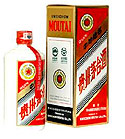 A few days ago, an American journalist passing through Xinjiang asked me a simple question: could I think of anything in Korla that represents this city's reputation as a western China boomtown? At the time, all I could think of were places. The PetroChina skyscraper, that garish new bridge covered with color-changing LED lights, the southward extension of a promenade along the Kongque River... pretty boring stuff.
A few days ago, an American journalist passing through Xinjiang asked me a simple question: could I think of anything in Korla that represents this city's reputation as a western China boomtown? At the time, all I could think of were places. The PetroChina skyscraper, that garish new bridge covered with color-changing LED lights, the southward extension of a promenade along the Kongque River... pretty boring stuff.
If only I could come up with the perfect story, one that reflects a growing suspicion that Korla's citizens have lots of cash stuffed under their mattresses but very little idea what to spend it on. Please help me, Reuters!
Quality supervisors raided a hotel in far west China and made the biggest-ever seizure of fake maotai, the fiery national liquor favoured by Communist Party leaders at state banquets....
More than 2,500 bottles of fake maotai were found at a hotel in Korla in the predominately Muslim region of Xinjiang, the Beijing News said....
The fake liquor, sold at 1,680 yuan (US$225) per bottle, was manufactured in Beijing, it added, but did not say whether anyone had been detained or fallen ill.
Yes. That story will do just fine. And as a bonus prize, that's 2,597 bottles (according to Chinese reports) of fake, throat-burning, gut-curdling baijiu that I won't have to pretend to enjoy drinking.
Maybe I'll get lucky today and they'll crack down on all the sub-standard mooncake dealers before Mid-Autumn Festival gets kicking. But please, Mr. Policeman, act quickly... in only a few hours it will already be too late! (Actually, I'll be leaving town just in the nick of time this evening for a bit of travel. Don't expect too many posts from me until after the National Week holiday.)
For all of you baijiu lovers and haters out there, check out these "appreciation" tips from the good people at Moutai:
It is never too much to drink with a bosom friend, and Moutai makes your drinking more fragrant.
The opening of Moutai will first present people with a kind of indescribable excitement, and then wonderful odor will fill the room.
There are 3 types in the tasting of Moutai: one is sip, two is smack, and three is to breathe out. These 3 styles shall be carefully arranged into one action, where your mind shall be concentrated to use your tongue and nose to capture, sense and experience the flavor of each liquor molecule. And these 3 styles shall form a perfect combination so as to enable you to have the experience of beauty.
In complement with the taste of flavor through sipping, smelling the empty cup is equally interesting. When a cup of Moutai has been drunken, bring the cup close to the nose, with the mouth still with remaining flavor, hold your breath first, slowly smell the flavor, then breathe deeply, and take the flavor into your guts as if you have entered into a whole new world.
Funny stuff, eh? Those of you who aren't familiar with the peculiar taste of baijiu can replace the word Moutai above with a disgusting substance of your own choosing (vomit, feces, bile, etc.) and you'll be in on the joke.
China smashes hotel fake liquor racket
24 Sep 2007
Reuters
BEIJING, Sept 24 (Reuters) - Quality supervisors raided a hotel in far west China and made the biggest-ever seizure of fake maotai, the fiery national liquor favoured by Communist Party leaders at state banquets.
Fake liquor is common in China, which has been assailed on all sides over health safety in recent months involving exports ranging from toothpaste, tyres and toys to seafood and drugs.
China executed six people in 1998 for producing and selling liquor tainted with methanol which killed 30 people in one of China's worst poisoning case.
More than 2,500 bottles of fake maotai were found at a hotel in Korla in the predominately Muslim region of Xinjiang, the Beijing News said.
It was the biggest case involving the fake liquor, which can be priced from a few hundred yuan to a staggering 38,000 yuan ($4,900) for an 80-year vintage, the newspaper said.
The fake liquor, sold at 1,680 yuan per bottle, was manufactured in Beijing, it added, but did not say whether anyone had been detained or fallen ill.
Maotai, a pungent drink made from sorghum and grain and measuring 53 percent alcohol by volume, is steeped in Communist lore. Maotai's origins can be traced back two millennia, and it became the drink of choice for generations of Communist leaders.
It was used to toast the founding of the People's Republic on Oct. 1, 1949. And Premier Zhou Enlai welcomed U.S. President Richard Nixon with maotai during his groundbreaking trip to China in 1972.
In another health scare, eight types of mooncakes, eaten to celebrate the upcoming Moon Festival, were found to contain excessive bacteria in one of Beijing's biggest chain supermarkets, the Beijing Times said.
Deputy Agriculture Minister Gao Hongbin separately told a news conference on food safety that the government would crack down on the use of banned pesticides and step up monitoring of veterinarian drugs and markets.
posted September 25, 2007 at 12:56 AM unofficial Xinjiang time | Comments (56)
September 21, 2007
I Smell a Russian Made-for-TV Movie.
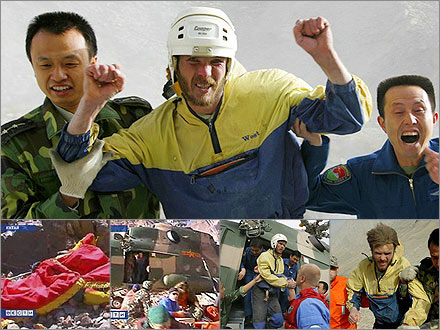
I've so far refrained from mentioning the story of six Russians who went missing during an extreme canoe trip in Xinjiang. I figured they'd probably all end up dead, and without details where's the story?
A quick summary: Six Russians came to Xinjiang for an expedition along the Yurungkax River near Hotan starting on August 21st. The river is located in a very remote area at an altitude of over 3000 meters, fueled by runoff from the Kunlun Mountains and filled with lots of nasty, sharp rocks. It's generally considered a death trap... which makes it an extreme sports super-adventure, dude! None of the six showed up to meet their guide as scheduled on September 2nd, and had been feared dead for more than two weeks. In just the past few days, three of the canoers' bodies have been recovered.
But, lo and behold, things have turned out better than one expects in these sorts of hopeless situations:
Rescue teams on Friday found two members of a missing Russian canoeing expedition who had survived for nearly three weeks without food in remote gorges in western China.
Television pictures showed one survivor, Alexander Zverev, bearded and looking thin and dazed as he stepped out of Chinese military helicopter after being rescued. He still wore his white canoeing helmet and a yellow and blue waterproof jacket.
Zverev told Russian TV station Vesti-24 by telephone he believed all five of his teammates had died in the accident when they were swept into the river. But hours later Russia's emergencies ministry said another survivor, 28-year-old Andrei Pautov, had been found.
If you read on a bit, it seems that these guys weren't quite prepared to undertake such an extreme canoeing adventure:
First the canoe carrying two people capsized, Zverev said. The following four-man canoe saw the capsized raft too late and all they could do was scoop the two bodies out of the water and lay them out on a river bank.
Still days from help, they relaunched their canoe, but it too capsized.
If you're going out into the wilderness to participate in an event which has a decent chance of getting you killed, can I recommend taking a satellite phone? Had one been available in this case it might have saved a couple of lives. Oh, also, rule of thumb... when a raging white-water beast has just killed two of your buddies, it's time to stop boating for the day.
At least Alexander and Andrei can look forward to their fifteen minutes of fame, followed by a cheap made-for-TV movie and a lifetime of nightmares in which their best friends die just out of reach again, and again, and again. Sigh.
Two missing Russians canoeists rescued in China
21 September 2007
Reuters News
(c) 2007 Reuters Limited
(Releads with discovery of second survivor)
BEIJING, Sept 21 (Reuters) - Rescue teams on Friday found two members of a missing Russian canoeing expedition who had survived for nearly three weeks without food in remote gorges in western China.
Television pictures showed one survivor, Alexander Zverev, bearded and looking thin and dazed as he stepped out of Chinese military helicopter after being rescued. He still wore his white canoeing helmet and a yellow and blue waterproof jacket.
Zverev told Russian TV station Vesti-24 by telephone he believed all five of his teammates had died in the accident when they were swept into the river. But hours later Russia's emergencies ministry said another survivor, 28-year-old Andrei Pautov, had been found.
In his interview Zverev said both the expedition's canoes capsized, throwing the crews into the turbulent river.
"A man cannot fight that water for a long time. He manages to fight for a few minutes and then his strength disappears," Zverev said. "Then only a miracle can save him."
First the canoe carrying two people capsized, Zverev said. The following four-man canoe saw the capsized raft too late and all they could do was scoop the two bodies out of the water and lay them out on a river bank.
Still days from help, they relaunched their canoe, but it too capsized.
Zverev said he believed he had survived because the canoe threw him clear of the foaming water and onto a bank.
The Russians started their canoe trip along the Yurungkax River in Xinjiang province in mid-August but failed to meet their Chinese interpreter in Hotan as planned on Sept. 2, and the alarm was raised.
Rescuers found three bodies last weekend.
The stretch of river the team was navigating was remote and uncharted, Zverev said. "It was clear to me from the first day that we would not be able to complete our chosen route.
"This was the most difficult section of the river, and if the tragedy had not happened when it did it would have happened the next day," he said.
For 20 days, Zverev lived without food in a cave and climbed to the top of the ravine each day to try and catch the attention of the rescuers he knew would be searching for the team.
"You're all excellent," he said at the end of the telephone interview, his voice trailing off. "Hello country, I love you all."
posted September 21, 2007 at 11:31 PM unofficial Xinjiang time | Comments (44)
September 19, 2007
Sad Mao, Happy Mao.
I'm not sure how well-known this little trick is, so I've decided to share it with the teeming masses seeking entertainment. With a few simple folds, you can make Mao's straight-faced portrait on any denomination of Chinese currency smile and cry. Here's a diagram of how to do the folding:
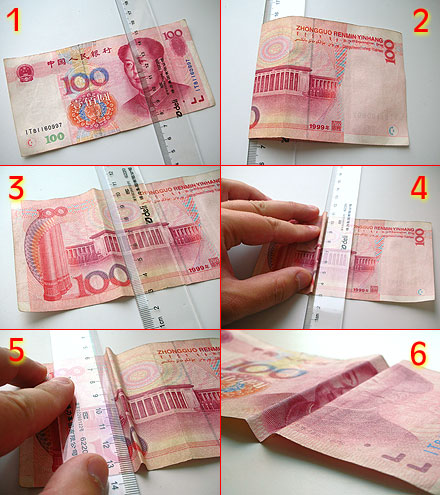
These steps are a bit overcomplicated, so if you prefer you can just look at step 6 and make the folds as you prefer. The spacing between the folds needs to be about 0.3cm - 0.4cm for the optimal smiling/crying effect, with the center fold going right through Mao's philtrum (the groove above the upper lip).
By tilting the bill up and down a bit after the folding is done you can expect these hilarious results:
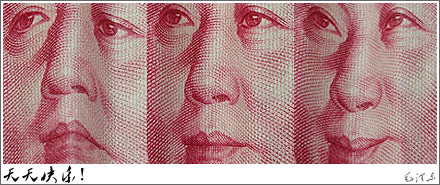
For some reason, when I took the photo of Mao frowning his eyes turned a bit Sloth-like (as in Sloth from The Goonies). This trick looks better in person than it does above. The folding isn't an exact science, but with a bit of practice you'll be able to entertain any man, woman, or child in China at a moment's notice.
Of course, the hard part is making sure you've always got a portrait of Chairman Mao in your pocket. Maybe it's time you gave up that teaching job and started selling heroin? (Positions available; inquire within.)
Much thanks to the lovely Song Linxuan of Tianjin for showing me how to do this.
UPDATE: It turns out that this is actually a well-known optical illusion, at least for US currency. For better results you should make a fold through each of the eyes first and then an opposite fold in the middle. Mao's emotions will be yours to play with as you wish:
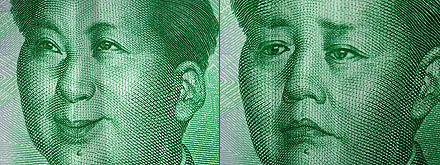
Awwwww.
posted September 19, 2007 at 08:52 PM unofficial Xinjiang time | Comments (7)
September 15, 2007
High as Hell in Xinjiang
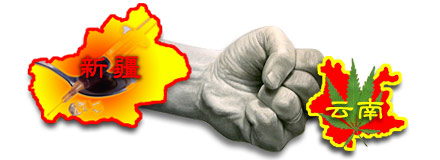
And we ain't comin' down, boyeeee! What, you thought Yunnan was the place to satisfy your heroin cravings in a hippy-friendly atmosphere? Well, the hippy-friendly part is still true, but for illegal drugs in China, Xinjiang is where it's at:
An explosion in the flow of illegal drugs from Central Asia has seen Xinjiang overtake Yunnan as the mainland's narcotics trafficking and dealing hub....
Li Yanming , a criminologist in the Xingjiang capital Urumqi , said drug dealers in the autonomous region had a national network employing more than 10,000 people long-term. The network controlled the drug supply in Yunnan, Guangdong and Beijing, Professor Li said.
"President Hu Jintao said in an internal circular that all police must be mobilised to block the Golden Crescent," he added.
But the job was complicated, Professor Li said, because the region is politically sensitive.
"Any large-scale police action could be used by [Uygur] separatists as evidence that the central government oppresses local people," he said.
You can read the full article from SCMP below.
Xinjiang becomes hub for Central Asia's drug trade; Almost 70kg of heroin seized in northwest this year
Stephen Chen
15 September 2007
South China Morning Post
(c) 2007 South China Morning Post Publishers Limited, Hong Kong. All rights reserved.
An explosion in the flow of illegal drugs from Central Asia has seen Xinjiang overtake Yunnan as the mainland's narcotics trafficking and dealing hub.
By the end of last month, police in the far northwestern region had cracked 18 cases of drug smuggling from the Golden Crescent - an area that overlaps Afghanistan, Iran and Pakistan - up from four in the same period last year, Xinhua reports. The amount of heroin seized, almost 70kg, represented a jump of 12 times on the same period last year.
The quantity of drugs flowing from the Golden Triangle - the opium-growing region overlapping Myanmar, Laos and Thailand - also increased, with a jump in the number of people arrested on planes and trains for trafficking drugs to Yunnan and Sichuan .
Xinjiang anti-narcotics detective Zhang Shouchao said the situation was grim.
He would not say more because the issue was very sensitive.
"We are not allowed to publicise figures until the leadership [of the region's police department] has reached a consensus," he said.
Ya Sen , a professor at the Xinjiang Police Officer Academy, said: "Many investigations have not been made known to the public. The published figures represent only a fraction of the massive transportation [of drugs] from Afghanistan to China."
Surging opium production in Afghanistan was the main reason for the increase in the flow of drugs, he said. The area under opium cultivation in Afghanistan had increased 40 per cent this year so far, following a 50 per cent expansion last year, Professor Ya said.
Xinjiang has a Muslim Uygur minority and borders eight countries - Russia, Kazakhstan, Tajikistan, Pakistan, Kygyzstan, Mongolia, India and Afghanistan.
Before the US-led invasion of Afghanistan following the September 11 attacks, few of the drugs funnelled through Xinjiang came from that country because its radical Islamic Taleban rulers had rooted out most plantations for religious reasons.
"Many Afghans lost their savings and livelihoods in the war, and look to opium for an income {hellip} and an increasing number of terrorists also stimulate the production and trade of opium and other drugs," Professor Ya said.
Li Yanming , a criminologist in the Xingjiang capital Urumqi , said drug dealers in the autonomous region had a national network employing more than 10,000 people long-term.
The network controlled the drug supply in Yunnan, Guangdong and Beijing, Professor Li said.
"President Hu Jintao said in an internal circular that all police must be mobilised to block the Golden Crescent," he added.
But the job was complicated, Professor Li said, because the region is politically sensitive.
"Any large-scale police action could be used by [Uygur] separatists as evidence that the central government oppresses local people," he said.
posted September 15, 2007 at 10:13 AM unofficial Xinjiang time | Comments (70)
September 12, 2007
More on Me, Moron Me.
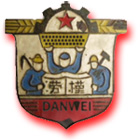 Just back from a week with the TV crew (see previous entry), and boy, am I tired. I spent day after day riding camels up sand dunes; gently caressing huge bunches of Turpan grapes; looking thoughtfully at the horizon; dancing like an idiot with Uyghurs; talking about "the sense of peace" one gains living in Xinjiang; and generally making an ass of myself. I suppose that's the price of fame, and like most adventures it has already become a priceless memory... now that all the hard work is over. I'll be sure to get the show up on YouTube and posted on this site when it airs sometime next year.
Just back from a week with the TV crew (see previous entry), and boy, am I tired. I spent day after day riding camels up sand dunes; gently caressing huge bunches of Turpan grapes; looking thoughtfully at the horizon; dancing like an idiot with Uyghurs; talking about "the sense of peace" one gains living in Xinjiang; and generally making an ass of myself. I suppose that's the price of fame, and like most adventures it has already become a priceless memory... now that all the hard work is over. I'll be sure to get the show up on YouTube and posted on this site when it airs sometime next year.
While I was away, I was awarded one of Danwei's 2007 Model Worker Awards (that badge above) in the City & Province Blogs category... which is quite a coincidence, as this week I also learned from the crew of China Right Here that they've been following Jeremy Goldkorn (Danwei's overlord and main contributor) around as well. The competition is on to see which one of us can look stupidest in our 22 minutes on Tianjin TV. (I suspect that I'll win.)
Here are a few more photos from some the shoot locations. These were taken by me, so unfortunately they don't capture the most embarrassing moments. You'll just have to wait for the broadcast to laugh at (and with) me.
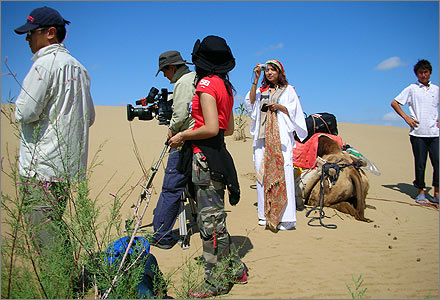
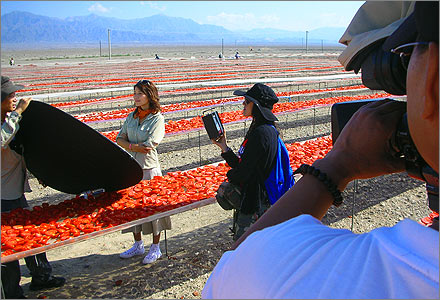
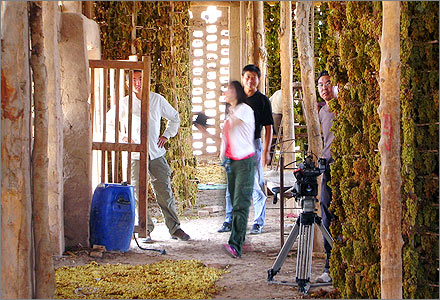
 In other news, my life has been changed for the better by downloading the TVUPlayer, which I recommend for all expats, especially those of you without access to any decent TV. I learned about the software from Manus up at the Fubar, who uses it to catch soccer (err, football) action on Sky Sports. There aren't a whole lot of channels available, but the current list provides some much-needed mind-numbing televised entertainment: CBS, Fox, Fox News, ABC News Now, Comedy Central, SpikeTV, Adult Swim, the Sci-Fi Network... plus a whole lot of Chinese, French, and religious/karate/useless channels that I'll never watch.
In other news, my life has been changed for the better by downloading the TVUPlayer, which I recommend for all expats, especially those of you without access to any decent TV. I learned about the software from Manus up at the Fubar, who uses it to catch soccer (err, football) action on Sky Sports. There aren't a whole lot of channels available, but the current list provides some much-needed mind-numbing televised entertainment: CBS, Fox, Fox News, ABC News Now, Comedy Central, SpikeTV, Adult Swim, the Sci-Fi Network... plus a whole lot of Chinese, French, and religious/karate/useless channels that I'll never watch.
Don't forget about the commercials. How long has it been since you've seen a late-night TV spot for mortgage refinancing or an easy-to-read meat thermometer? The picture quality is great. The best thing is that it's all free and works like a charm, at least for the moment.
No word yet on the legality of watching foreign programming with the TVUplayer, but if you're living in China do you really worry about copyright laws?
L'shanah tovah tikatevu to all the chosen people out there.
posted September 12, 2007 at 03:11 PM unofficial Xinjiang time | Comments (44)
September 05, 2007
China Right Here... In My Bedroom!
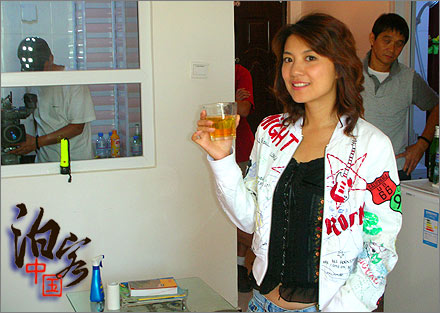
Somebody out there thinks I'm interesting! What a great feeling.
And with that in mind, a crew from Tianjin TV's China Right Here program has been following me around for the last few days. (The show travels around China in search of foreigners doing something interesting, like the woman who invented Tibetan braille. Why I deserve this treatment is beyond me.) In fact, at this very moment I'm being filmed being a blogger.
So, this is a blog entry, and the photo above is me being filmed being an interesting blogger. That lovely gal in the center of the photo is Yin Chang, the host of the program. (Sorry fellas, she's married!) Anyway, we've hit up Urumqi, the sundried tomato factory in Hejing, and my apartment here in Korla. Tomorrow, it's on to the desert and perhaps the beautiful scenery of Kuqa. Of course, it'll probably be a year before any of this footage sees the light of day.
Well, that's all... they've finished shooting me blogging, and I didn't really have anything to say in the first place. Pardon the interruption.
posted September 05, 2007 at 04:23 PM unofficial Xinjiang time | Comments (113)
